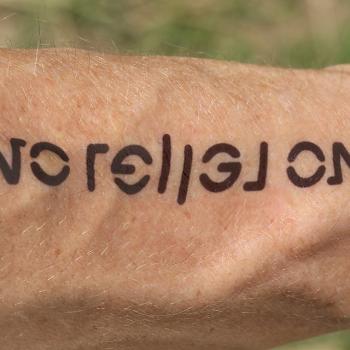Editors' Note: This article is part of the Patheos Public Square on the Spirituality of Sex. Read other perspectives here.
Macy never thinks about herself. She is utterly uninterested in her inner life, in examining her motivations, regretting decisions, or worrying about tomorrow. In an age of relentless, exhausting self-fascination, Macy gently offers an alternative—blissful self-forgetfulness.
The thing is, Macy's a Boston Terrier. So ugly she's cute, I quickly find myself talking about Macy, her bug eyes, her weird yoga poses, her insatiable licking. But Macy doesn't talk about Macy; as far as I know, Macy is completely unaware of Macy. Unaware of herself, she is incapable of considering herself. She loves to nibble bits of carrot, but she never takes a stance over against herself, measuring, interpreting, or judging her desire to chow down.
Things are different for humans. Last night, I ate most of the mint chocolate chip ice cream in the small (really, it was small!) tub in my freezer. I didn't have to; I kind of wish I hadn't (but it was so good...). I could have considered my late-night desire for comfort food as a desire to be denied for the sake of something better—health, perhaps even holiness. As I type this, I am re-considering that decision, mildly regretting my lazy acquiescence to a gluttonous desire at the end of a long day. Macy, God bless her, is free from all such assessment.
Almost all people in almost all cultures for almost all of history (ours is one of the few exceptions) have known that we are more than our desires. In fact, our capacity for self-transcendence, for considering "oneself as another" (as Paul Ricoeur put it) by discovering, discerning, and deciding what to do with what we want is what sets us apart from non-human animals. Human uniqueness and human dignity are closely related to our capacity for self-transcendence. Macy can't help herself; we can.
The adventure—frightening, bracing, beckoning, liberating—of life can be mapped along our efforts to answer the question: "What do I do with what I want?" Of course, first I've got to figure out what the heck it is that I want. This is hardly obvious, even when think it is. When I see a beautiful woman, do I want her? Maybe. But then why do so many people get what they want only to find that they don't really want what they've got? Even more, why do so many get what they want and yet find themselves wanting more? Saul Bellow's protagonist in Henderson the Rain King lives with an achingly insistent cry of "I want!" coming from somewhere deep within him, a cry that persists from his tired marriage in America throughout his adventures in remote Africa. We're quick to scoff at the immaturity of someone who marries and finds himself dissatisfied. He just needs to grow up.
But the Christian tradition insists that nothing in all of creation can fully satisfy a person. Dissatisfaction in itself needn't imply immaturity; in fact, it is ingredient in what it means to be human. Christians of every make and model know that Augustine had it right: "You had made us for yourself, and our heart is restless until it rests in you."
***
I write this as a single man living under the conviction that extra-marital sex is sin. One might think that the only thing someone like me needs to know about sex is that I'm not supposed to do it. But that suggests that celibacy is frigidity, that the fires of passion are tended only by the sexually active. I suspect this is obvious to most Americans these days—who could imagine a more insipid, emasculated, and lifeless person than a celibate man? Sure, there are monks; but they're weird, secret deviants, or closeted. So goes conventional wisdom.
On the contrary, I want to suggest that this wisdom is folly and that single people who don't have sex witness to the depth and complexity of desire, something to which the sexually active in our day are often blind.
I teach Christian college students. All of them have sexual desires; and, believe it or not, almost all of them are not having sex. Their very refusal to express their sexual desires by immediately gratifying them sexually with the first willing and able partner opens up a question: If I'm not going to assume that sexual desires must be satisfied by sex, what am I going to do with them? These students know that they are not like Macy, who can only ever immediately seek to get what she wants. Discovering desires within themselves, they aren't fated to directly satisfy them; they can instead discern their desires and decide what to do with them.
Celibate singles are particularly well-situated to recognize desires for what they are: clues, bread crumbs, doorways, signposts. By not assuming that every (sexual) desire is to be immediately satisfied, these single people open themselves to the question of their desire. "What do I do with what I want?" becomes, "What do I really want?" And, "If I really want 'x,' what should I do with what I happen to want right now?" My very longing for something I deny myself (sex), wakens me to deeper questions of what I most want, which are questions about who I am, what the world is, where I come from, and where I'm going. Perhaps this is what Augustine meant when he said, "Desiderium sinus cordis—longing, yearning makes the heart deep."




